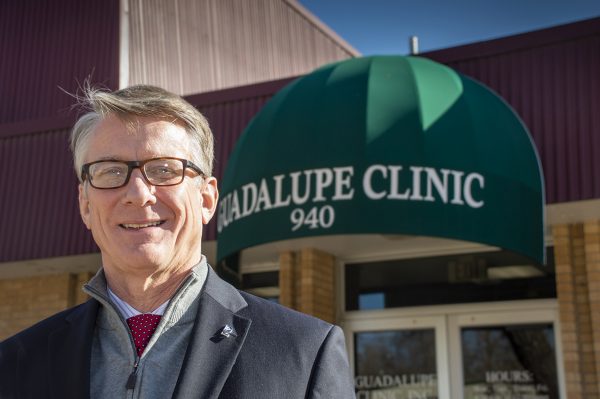New Guadalupe Clinic exec ‘listening’ for three months

J.V. Johnston is the new executive director of the Guadalupe Clinic, a diocesan ministry. (Advance photo)
J.V. Johnston says the Guadalupe Clinic is on solid footing as are its finances and its volunteer base.
Johnston, the clinic’s executive director, said when he started Jan. 3, he committed to simply listen for 90 days.
“But, I am already seeing some opportunities,” he said from his office at the main clinic location on South St. Francis in Wichita. “Some opportunities to see more patients and maybe increase the quality of care for our patients.
Johnston, the former vice president for University Advancement at Newman University, said just because someone is poor doesn’t mean they shouldn’t get good, quality healthcare.
Directly connected to that is the quality of volunteers the clinic has, he said.
“What I’ve found is a lot of dedicated people, really dedicated people,” Johnston said. “One of the things that drew me was the 7,800 hours that doctors and nurses and pharmacists volunteer at the clinic.”
He said he was amazed that such highly compensated people have that much passion. “The clinic must have a powerful mission if they’re willing to do that, and they must have a big heart for that mission.”
The clinic’s mission is to serve the poor. But, about half of its clients are so poor they can’t afford the suggested $5 donation.
Clinic is similar to other clinics
Nonetheless, the Guadalupe Clinic is much like any other clinic, Johnston said. Patients come in and fill out a history sheet. When they go to the examination rooms, a nurse will take their vitals before they are seen by a physician or a physician’s assistant.
“We also have specialists who come in once a week or once a month,” he said.
The clinic is a partner with Project Access, which coordinates donated medical care for uninsured, low-income residents of Sedgwick County. Through Project Access, patients can see a specialist at the specialist’s office.
One distinguishing factor of the Guadalupe Clinic is that about half of its patients are primarily Spanish-speaking, so the clinic’s receptionists are bi-lingual.
Another difference, he said, is at the end of a patient’s visit their prescription will be filled by the clinic’s pharmacy staffed by a pharmacist and some techs.
“Only about half of the people given a prescription fill it – even for people who have insurance,” Johnston said. “Well, people with no money…do you really think they’re going to fill their prescription?”
Clinic helps patients with medication
Guadalupe Clinic patients leave with their medication and instructions about how to take it, he said.
With the changing political climate in mind, Johnston asked his fellow workers if Medicaid expansion would affect the clinic.
“Oh, we’ll have plenty of patients,” they told him.
The reason is partly that the clinic already has a backlog, he said, and because there are situations, such as those affected by layoffs, who can’t afford to extend the insurance they had.
“We have entrepreneurs who start businesses and can’t afford health insurance, they’re just trying to pay the light bill to get the business going,” he said.
“We have people working two and three jobs, 15 hours here, 20 hours there, who don’t have health insurance. And we have another group who are off the grid, who don’t file income tax returns, and work for cash.”
The clinic gets an array of patients, he said, including those who fall through the cracks.
So, Johnston said, for now, he is working with the clinic board, the foundation board, and listening to volunteers, staff, and patients about a strategic plan for the clinic.
“We have a year and a few months left on the present plan,” he said. “We’ll try to accomplish those goals and then, starting this fall, we’ll start the process of developing a new, probably three-year, strategic plan with goals that are measurable.”
